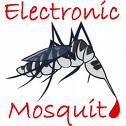e-Mosquito – A New Device To Check Blood Sugar Level
 To help millions of diabetes patients worldwide who need regular glucose monitoring, electric engineers from the Schulich School of Engineering at the University of Calgary have developed an electronic mosquito for them.
To help millions of diabetes patients worldwide who need regular glucose monitoring, electric engineers from the Schulich School of Engineering at the University of Calgary have developed an electronic mosquito for them.
Based on the mosquito’s biting mechanism, the newly developed device can draw blood easily without any pain.
The electronic bandage, which is just about the size of a deck of cards, makes use of four tiny needles, which bite deep enough to take out blood from the capillary without causing any harm to the nerves.
A sensor in the patch assesses the blood sugar levels.
The data can then be transferred wirelessly to a small monitoring device worn on the wrist. Because of the size of the patch, it can be worn anywhere on the body.
Martin Mintchev, the director of the Low Frequency Instrumentation Lab at the Schulich School of Engineering, said, “[The needles] can bite through the skin individually and sequentially, each extracting a blood sample, analyzing it and transmitting the information.”
Moreover, the e-Mosquito could also be attached to an alarm to alert people if their blood sugar levels dropped too low.
“This is a dramatic improvement over manual poking, particularly for children and elderly patients,” said Martin Mintchev, director of the Low Frequency Instrumentation Lab at the Schulich School of Engineering.
“Our approach is radically different and offers a reliable, repeatable solution with the minor inconvenience of wearing something similar to an adhesive bandage.”
Mintchev along with Karan Kaler, director of the Schulich School's Bio-Micro Electromechanical Systems (MEMS) Laboratory, took three years in designing the device.
Now they aim to reduce the size of the patch and accommodating more needles. If that goes on, diabetics would be capable of wearing the patch for longer periods of time and examine their blood even while sleeping.
The researchers have to discover an industry associate before the device can be commercialized.
“It's important to find an industry partner for this project," says David Reese, project manager with University Technologies International. "Industry has the resources and expertise to speed up the process of product development and bring this technology to market for the benefit of patients."